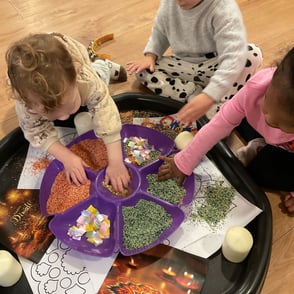What Is Emotional Development in Early Childhood?
Emotional development in early childhood refers to how children learn to understand, express, and manage their emotions in healthy ways. It includes recognizing feelings like happiness, sadness, or frustration, and using strategies to cope with them.
While often mentioned together, emotional and social development are not the same. Emotional development focuses on self-awareness and regulation, whereas social development involves how children interact with others. Still, both are closely connected; children who understand their own emotions are better able to build friendships, show empathy, and resolve conflicts.
The importance of emotional growth in early years cannot be overstated. Research shows that children with strong emotional skills adapt more easily to school, develop healthier relationships, and perform better academically (Denham, 2006).
Book Online TourBook A VisitKey Stages of Emotional Development in Early Childhood
Emotional growth unfolds gradually, with each stage building on the last. Here are the main stages of emotional development from birth to age seven:
- Infancy to Toddlerhood (0–2 years): At this stage, attachment and trust are central. Babies bond with caregivers, seek comfort, and begin to display emotions like joy, fear, or anger. By age two, toddlers often express independence, sometimes through tantrums!
- Preschool Years (3–5 years): Children begin to regulate their emotions more effectively. They develop empathy, learning to comfort a sad friend, or share toys. Pretend play and storytelling become important tools for emotional expression.
- Early School Years (6–7 years): Friendships take on deeper meaning. Children grow in self-awareness, understanding that emotions influence behavior. Problem-solving skills emerge, helping them navigate conflicts in healthier ways.
Social and Emotional Development: How They Work Together
So, what is social and emotional development in early childhood? In essence, it’s the blending of emotional understanding with social skills.
Examples include:
- Sharing toys during playtime
- Working together on group projects
- Resolving arguments respectfully
Strong socio-emotional development in early childhood predicts better academic performance and reduces behavioral challenges later on. Studies suggest children who build empathy and teamwork skills early are more likely to thrive socially and emotionally in adolescence (Jones et al., 2015).
You can also explore how social development plays a foundational role in nurturing emotional intelligence.
Signs of Healthy vs. Delayed Emotional Development
Understanding the signs of low vs. healthy EI is vital for parents and educators.
Positive signs of emotional development in early childhood:
- Expressing a wide range of feelings
- Comforting others who are upset
- Using words to talk about emotions
Red flags to watch for:
- Frequent emotional outbursts beyond the expected age
- Withdrawal from peers
- Difficulty recognizing others’ emotions
If concerns persist, consulting a child development specialist can provide early support. You may also find it helpful to explore practical strategies in our blog on: How to Overcome a Lack of Emotional Intelligence in Children
Activities for Supporting Emotional Development in Children
Practical activities can make emotional development in early childhood fun and engaging. At Hatching Dragons, we weave these into our learning culture:
- Role-play and puppetry: Children act out everyday scenarios, like asking for a turn, helping them rehearse empathy and problem-solving.
- Emotion cards and games: Visual tools help children label and express feelings.
- Storytelling and reflection: Multicultural tales provide opportunities to discuss values and emotions, while also celebrating cultural diversity.
- Group activities: Cooperative art or building projects encourage teamwork, patience, and shared achievement. These are also great for reinforcing positive behaviour across settings.
These activities for emotional development in early childhood support children in understanding their own emotions while respecting others.
The Role of Parents and Educators in Emotional Development
Parents and teachers play a central role in supporting social and emotional growth:
- Modeling healthy behavior: Children imitate how adults handle stress, anger, or joy.
- Encouraging open dialogue: Regular conversations about emotions at home and in the classroom build trust.
- Structured learning programs: Early years settings like Hatching Dragons use carefully designed routines to nurture both academic and emotional skills.
When parents and educators collaborate, children benefit from consistent reinforcement of healthy emotional habits.
Why Emotional Development Matters for Lifelong Success
The importance of social and emotional development in early childhood extends far beyond preschool years. Strong emotional foundations contribute to:
- Resilience: The ability to cope with setbacks
- Leadership: Skills in empathy and decision-making
- Mental health: Lower risk of anxiety or depression later in life
Investing in social and emotional development in early childhood is one of the most effective ways to prepare children for academic, social, and personal success.
A Week at Hatching Dragons: A Glimpse into Emotional Learning
Last week at Hatching Dragons, our August activities showcased how we nurture emotional intelligence:
- Monday: Circle time with emotion cards, helping children share how they feel.
- Tuesday: Role play in both English and Mandarin, practicing empathy and respect.
- Wednesday: Storytelling around kindness with guided reflection.
- Thursday: Cooperative art projects encouraging teamwork.
- Friday: Celebrating children’s empathy on the Value Wall.
Each month, new cultural lessons and activities are introduced, ensuring emotional learning is woven into daily experiences.
FAQs
Q1: What is emotional development in early childhood?
It’s the process of children learning to understand, express, and manage feelings. Emotional development in early childhood shapes relationships, learning, and resilience.
Q2: Why is social and emotional development important for children?
Because social and emotional development in early childhood builds empathy, cooperation, and problem-solving skills that prepare children for school and life.
Q3: What are some examples of emotional development in early childhood?
Examples include comforting a peer, taking turns, expressing frustration with words, and celebrating shared achievements.
Q4: What activities help improve emotional development in preschoolers?
Role-play, puppetry, emotion cards, and group art are effective activities for emotional development in preschoolers.
Q5: How can parents and teachers work together to support emotional growth?
By modeling emotional health, creating safe spaces for expression, and reinforcing consistent strategies at home and school can help promote emotional intelligence.
Call to Action
At Hatching Dragons, we understand that emotional development in early childhood shapes confidence, resilience, and lifelong learning. Our nurseries weave values, empathy, and emotional intelligence into daily experiences through play, storytelling, and cultural learning.
If you’d like to see how we can support your child’s growth, you can Book a Visit or Contact Our Team to learn more.
References
- Denham, S. A. (2006). Social-emotional competence as support for school readiness: What is it and how do we assess it? Early Education and Development, 17(1), 57–89.
- Jones, S. M., Greenberg, M., & Crowley, M. (2015). Early social-emotional functioning and public health: The relationship between kindergarten social competence and future wellness. American Journal of Public Health, 105(11), 2283–2290.
- Côté, S. (2014). Emotional intelligence in organizations. Annual Review of Organizational Psychology and Organizational Behavior, 1(1), 459–488.
- Mavroveli, S., & Sánchez-Ruiz, M. J. (2011). Trait emotional intelligence influences on academic achievement and school behavior. British Journal of Educational Psychology, 81(1), 112–134.
- Rivers, S. E., Brackett, M. A., Reyes, M. R., Elbertson, N. A., & Salovey, P. (2012). Improving the social and emotional climate of classrooms: A cluster randomized controlled trial testing the RULER approach. Prevention Science, 14(1), 77–87.

08-Sep-2025 17:44:57
Related Articles







Write a Comment